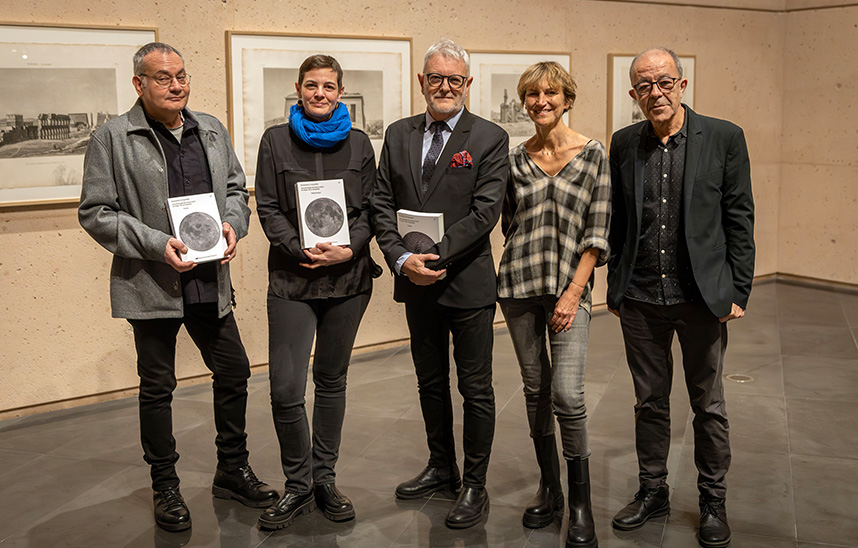The origin of photography: an unpublished project at Spanish, brought to life at the MUN

Photo /Martí Llorens, Rebecca Mutell, Valentín Vallhonrat, Ana Galán and Alejandro Castellote/ Jesús Caso.
28 | 02 | 2024
"This publication is the tool necessary for a deep understanding of the photographic phenomenon, by collecting the testimonies of the protagonists of its invention and its development". This is how he defines "Searching for the impossible. An anthology of texts on the origin of photography". the director artistic director of the MUN and coordinator of the book, Valentín Vallhonrat. The degree scroll gathers more than 1,200 pages of texts on the origin and development of photography that until now had not been translated from English and French to Spanish. Vallhonrat values the effort made by Rebecca Mutell and Martí Llorens, editors, in considering these texts to be of great use for all Spanish-speaking countries, among others, for researchers and academics.
The three have explained this morning the project to the media, whose presentation open to the public will take place today at 19h. in the MUN. The entrance is free, after collecting an invitation on the web or at locker, until fill in capacity. The independent curator, essayist and photography professor Alejandro Castellote will open the quotation with a lecture, which will be followed by a roundtable with the coordinator, the editors, and the translator, Ana Galán .
In his discussion paper, Castellote highlights the importance of the photographic medium "because our understanding of the world is elaborated from images". At the same time, he wonders how photography would have developed if, instead of being born in Europe, it had been born in China or Japan, inspired by the essay Elogiode la sombra, by the Japanese writer Tanizaki, which gives degree scroll to his intervention.
"Seeking the Impossible. An anthology of texts on the origin of photography" is a publication for the University Museum of Navarra. is a publication core topic for the Museo Universidad de Navarra, one of whose pillars is the photography collection, which spans from the origin of this medium to the present day, and which began in 1990 with the reception of José Ortiz-Echagüe's bequest . In Vallhonrat's words, it is "the perfect accompaniment to his collection". The project was born, precisely, as a result of a meeting on the occasion of a exhibition of Oritz-Echagüe at the Museo Nacional Centro de Arte Reina Sofía, in 1998. In it, Vallhonrat, Rafael Levenfeld (also director artist of the MUN and coordinator of the book, who died last November) and other experts agreed on the lack of reliable sources on the origin of photography and its beginnings in Spain, so they launched a series of strategies to compile them. After two congresses (one at the University of Navarra in 1988 and another at the IESE in Barcelona in 2004) and the launching of the MUN's "Tender Bridges" artistic residency program project (born in 2004), 25 years later, the book is now a reality.
Mutell and Llorens reveal the reason for "Looking for the impossible" as degree scroll of this work. It is the first letter that the lithographer Niépce received from Daguerre in 1862, in which he stated: "I too have been looking for the impossible for a long time", in reference letter to the technical and conceptual challenge that this new path implied.
The editors emphasize the rigor with which they have tried to respect the voices of this and the other authors whose texts make up the work, and that the heterogeneous and sometimes "convoluted" ways of writing have not always been easy to interpret. The different texts are accompanied by his and the translator's comments, to facilitate the interpretation, as well as to suggest new ways of reflection.
Vallhonrat points out the "careful and accurate translation" made by Ana Galán, since "it allows to understand texts that in their original language could be incomprehensible in some aspects", since there are issues that have fallen into disuse and terms that have changed over time.
The translator frames her work in the same principles that guided the birth of photography: "the constant search for detail, definition, precision, accuracy, and correspondence between the original and the final result ". For this work, Galán has carried out an extensive task of documentation, which he describes as "the Aristotelian method of, in the face of astonishment or bewilderment, investigating".
The publication consists of three volumes -Utopia, Materiality, Praxis- totaling more than 1,200 pages. The careful design, produced by the WellDone agency, facilitates reading, differentiating the original texts from the authors' comments and bringing the history of photography closer to experts and the general public in a pleasant and accessible way.




